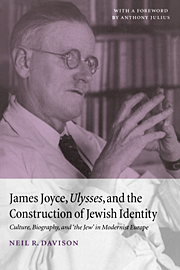 James Joyce, Ulysses, and the Construction of Jewish Identity
James Joyce, Ulysses, and the Construction of Jewish Identity Book contents
- Frontmatter
- Contents
- Foreword by Anthony Julius
- Acknowledgements
- List of abbreviations
- Introduction
- 1 Silence: family values
- 2 Silence: Jesuit years – Clongowes and Belvedere
- 3 Silence: university years – the Church, Dreyfus, and aesthetics
- 4 Exile: excursion to the Continent, bitter return
- 5 Cunning and exile: Greeks and Jews
- 6 Cunning: Jews and the Continent – texts and subtexts
- 7 Cunning: the miracle of Lazarus times two – Joyce and Italo Svevo
- 8 Ulysses
- Conclusion
- Notes
- Select bibliography
- Index
Foreword by Anthony Julius
Published online by Cambridge University Press: 05 April 2012
- Frontmatter
- Contents
- Foreword by Anthony Julius
- Acknowledgements
- List of abbreviations
- Introduction
- 1 Silence: family values
- 2 Silence: Jesuit years – Clongowes and Belvedere
- 3 Silence: university years – the Church, Dreyfus, and aesthetics
- 4 Exile: excursion to the Continent, bitter return
- 5 Cunning and exile: Greeks and Jews
- 6 Cunning: Jews and the Continent – texts and subtexts
- 7 Cunning: the miracle of Lazarus times two – Joyce and Italo Svevo
- 8 Ulysses
- Conclusion
- Notes
- Select bibliography
- Index
Summary
In this admirable work, which combines biography with literary criticism, Neil Davison introduces to a reading of Ulysses certain versions of anti-Semitism. These versions are those with which Joyce would have been familiar, either as a result of his upbringing in Catholic Ireland, or of his reading, or of his residence in Italy and Switzerland. The thrust of Davison's argument is that Joyce contested anti-Semitism by creating ‘the Jew Bloom’ (Svevo). Bloom is Joyce's philo-Semitic account of a Jew more truly representative of his people than the hostile stereotypes purveyed by anti-Semites. In Bloom, Joyce both created (or ‘constructed’) a character with innovative literary properties and aligned literature more closely with reality. Ulysses is thus good news for Jews, as well as for literature. The novel is a moral, as well as an aesthetic, triumph.
Much of Neil Davison's book is devoted to an elaboration of these anti-Semitisms. The picture that emerges is a complex one. Successive chapters detail the theological anti-Semitism of Irish Catholicism, the racist anti-Semitism of Dreyfus-affair France, the political anti-Semitism of Irish nationalism, the self-hating anti-Semitism of Otto Weininger, the complex, ambivalent anti-Semitism of Nietzsche (about whom I find Davison slightly too generous: one can be both an anti-Semite and an anti-anti-Semite).
- Type
- Chapter
- Information
- James Joyce, Ulysses, and the Construction of Jewish IdentityCulture, Biography, and 'the Jew' in Modernist Europe, pp. xi - xviPublisher: Cambridge University PressPrint publication year: 1996


